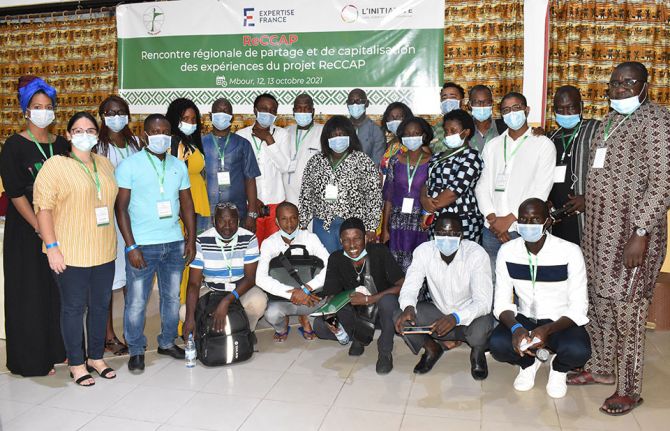

Feature Story
Capitalizing on experiences to improve HIV care for key populations in western Africa
18 October 2021
18 October 2021 18 October 2021Participants from four countries—Côte d’Ivoire, Guinea, Guinea-Bissau and Senegal—recently met in Saly, Senegal, to capitalize on the know-how developed during the implementation of the Capacity Building and Capitalization of Experiences for Improved HIV Care among Key Populations in West Africa (ReCCAP) project, implemented by ENDA Santé and funded by L’Initiative through Expertise France.
The project aims to strengthen local people so that they are able to map sites and estimate the size of key populations on a continuous basis at the local level, conduct detailed analyses of HIV services and needs, and use the results to adapt the services offered and increase their effectiveness.
“The lack of data on key populations hinders the development of interventions that address their specific needs. Programmatic mapping and size estimates are usually conducted by international consultants and are not always adapted to the needs of field actors, and data may exist but are often quickly outdated because targets are dynamic and mobile,” said Sidy Mokhtar Ndiaye, Research Manager at ENDA Santé.
Guinea-Bissau, for example, was able to share its experience in estimating the size and/or needs of four key population groups, including a needs analysis of prisoners in three prisons in the country. “This is the first time that a study on HIV has been done in prisons in the country. The data will be used for the development of the new national HIV strategic plan,” said Miriam Pereira, Monitoring and Evaluation Officer at ENDA Santé Guinea-Bissau. The country has completed the deployment of two national trainings, including on community-based surveillance, which has been useful for monitoring the COVID-19 pandemic, and on the implementation of key population mapping in four regions—Bissau, Bafatà, Bubaque and Mansôa—in sites including bars, restaurants, hotels and public spaces.
The meeting, which welcomed members of partner entities and people who had benefited from two regional trainings in 2019 and 2021, was an opportunity to share South–South operational experiences and to develop recommendations for scaling up lessons learned and extending the project, particularly in terms of geographic coverage, with the support of UNAIDS.
“Key populations and their sexual partners account for 69% of new HIV infections in western and central Africa. And yet in the region the funding received for programmes for key populations represents only 2.4% of funding between 2016 and 2018. Projects like ReCCAP are essential for advocating for greater investment in key populations and evidence-informed programming,” said Marie Engel, UNAIDS Regional Adviser.



